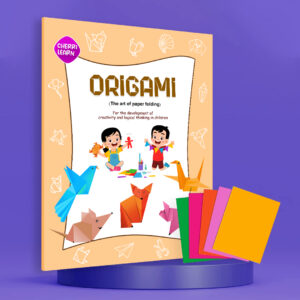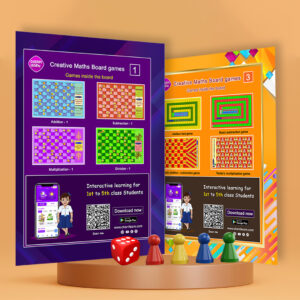Building Skills, One Fold at a Time

Are you tired of hearing your kids complain about being bored or glued to their screens? It’s time to embark on a journey of fun and easy learning activities that will not only keep them engaged but also help them develop essential skills. In this blog post, we’ll explore the world of paper folding and origami, a fantastic way to foster creativity, patience, and fine motor skills in children. So, grab some colorful paper and get ready to fold your way to educational fun!
The Magic of Origami: A Creative Adventure
Origami, the art of paper folding, isn’t just about creating beautiful paper sculptures. It’s a fantastic way to engage your child’s mind and promote learning through play. Whether your kids are preschoolers or preteens, there’s an origami project suited for their age and skill level. The best part? You don’t need fancy supplies; a few sheets of paper are all you need to get started.
Origami for Beginners: Building Foundations
If you and your child are new to origami, start with the basics. Begin with simple shapes like squares, triangles, and rectangles. Folding these shapes can be the first step in teaching your child about symmetry and basic geometry. You can use colored paper to make it more appealing and enjoyable. Challenge your child to create a rainbow of shapes!
Benefits Beyond Folding Paper: What Your Child Learns
Aside from the obvious benefits of honing fine motor skills and creativity, origami offers a plethora of other advantages. Here are some skills your child can develop while having a blast with paper folding:
Math Mastery: Origami often involves precise measurements and geometric concepts, making it an excellent stealthy math lesson.
Focus and Patience: Completing an origami project requires attention to detail and patience, valuable life skills.
Problem Solving: When a fold doesn’t go as planned, it’s an opportunity for your child to think critically and find a solution.
Spatial Awareness: Origami improves your child’s understanding of space, symmetry, and three-dimensional shapes.
Cultural Awareness: Origami has its roots in Japanese culture. Introduce your child to diverse traditions and customs through this art form.
Self-Esteem: Watching a flat piece of paper transform into a 3D masterpiece is a confidence booster like no other.
Fold, Learn, and Have Fun!
Incorporating origami into your child’s routine isn’t just about creating beautiful paper art; it’s about building skills, one fold at a time. Through fun and easy learning activities, your child can develop creativity, patience, math skills, and more, all while having a blast. So, why wait? Grab some paper and start folding your way to educational fun with your little one today. The world of origami awaits, and it’s filled with endless possibilities!

Origami, the ancient art of paper folding, isn’t just about crafting delicate paper swans or intricate flowers. It’s a magical gateway that can unlock a child’s creativity, foster patience, and encourage problem-solving skills. In this article, we will explore how origami enriches a child’s development and why it’s a valuable tool for parents and educators. Enhancing Fine Motor Skills: Origami requires precision and control over small movements, making it a fantastic activity for developing fine motor skills in children. The intricate folds and delicate creases demand attention to detail, helping kids refine their hand-eye coordination. Boosting Patience and Concentration: Patience is a virtue, and origami is a patient person’s game. Children, often accustomed to instant gratification in today’s digital world, can benefit immensely from the slow and meticulous process of origami. It teaches them to concentrate, follow instructions step-by-step, and persevere even when faced with challenges. Sparking Creativity: Origami isn’t limited to predefined patterns; it encourages creativity within constraints. As children gain confidence in basic folds, they often start experimenting with their designs. This process of creative problem-solving can be immensely rewarding for young minds. Geometry Unfolded: Origami is an excellent way to introduce kids to geometric concepts. They explore angles, symmetry, and spatial relationships intuitively, without realizing they’re learning math. This hands-on experience can make abstract mathematical concepts more accessible and enjoyable. Cultural Awareness: Origami is deeply rooted in Japanese culture, providing an opportunity to introduce children to diverse traditions. Learning about the history and cultural significance of origami can broaden their horizons and encourage respect for different customs. Eco-Friendly Crafting: Origami requires only paper – a readily available, eco-friendly material. Teaching children the importance of sustainability through this art form instills a sense of responsibility towards the environment. Stress Relief and Mindfulness: Origami is a calming and meditative activity. The repetitive folding motions can help children relax, reduce stress, and improve their mindfulness, providing an excellent antidote to the hectic pace of modern life. Fostering Social Bonds: Origami isn’t limited to solitary activities. It can be a group endeavor, encouraging children to share ideas, collaborate, and learn together. This promotes social skills, teamwork, and communication. Origami is more than just a craft; it’s a powerful educational tool that nurtures creativity, patience, problem-solving abilities, and a host of other skills in children. In a world increasingly driven by screens and instant gratification, introducing kids to the art of paper folding can open up a world of imagination, one delicate fold at a time. So, why not provide them with a stack of colorful paper and let their creativity take flight through the beautiful, ancient art of origami?

Mathematics has often been regarded as a subject of dread for many children. However, what if learning math could be as fun as playing your favorite board game? Enter the world of math board games – a captivating way to teach and reinforce basic math concepts while having a blast. In this article, we’ll explore how these games can transform math into an enjoyable adventure and help children master the fundamentals. 1. Learning Through Play: Math board games seamlessly blend learning with play, making it easier for children to absorb mathematical concepts. By turning math problems into engaging challenges, these games encourage active participation and enthusiasm. 2. Reinforcing Basic Math Skills: Whether it’s addition, subtraction, multiplication, or division, math board games provide ample practice for basic arithmetic. Through repeated gameplay, children become more confident in tackling these fundamental operations. 3. Problem-Solving Skills: Math games often involve strategic thinking and problem-solving. Players must figure out the best moves to win, which sharpens their analytical skills and helps them approach math problems with a problem-solving mindset. 4. Healthy Competition: Friendly competition in board games can motivate children to excel. When solving math questions becomes a part of winning, children are more inclined to improve their math skills to achieve success in the game. 5. Hands-On Learning: Math board games offer a tactile learning experience. Manipulating game pieces and engaging with the board provide a hands-on approach to math, which can be particularly helpful for kinesthetic learners. 6. Real-World Application: Many math board games simulate real-life situations, like managing money, running a store, or building structures. These scenarios show children how math is used in practical, everyday situations, making the subject more relatable and relevant. 7. Improved Memory and Concentration: Remembering rules, strategies, and numerical patterns in math board games enhances memory and concentration skills. These cognitive benefits extend beyond the game table to improve performance in math class. 8. Collaboration and Communication: Some math board games are designed for cooperative play. This encourages children to work together, discuss strategies, and communicate effectively, fostering social skills in addition to mathematical ones. 9. Reduced Math Anxiety: By presenting math as an enjoyable activity, math board games can help alleviate math anxiety. Children become more comfortable with numbers and equations, reducing the fear associated with math. 10. Lifelong Love for Learning: Math board games plant the seeds for a lifelong love of learning. When children experience the joy of discovering math through play, they are more likely to view learning as an exciting adventure, setting them on a path to continued educational success.
